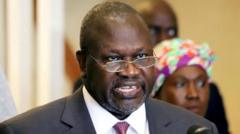In a dramatic turn of events in South Sudan, First Vice-President Riek Machar has been placed under house arrest, a move condemned by his party and the UN amid fears of renewed civil war. The situation escalates tensions between Machar and President Salva Kiir, with implications that may affect regional stability.
South Sudan's First Vice-President Riek Machar Placed Under House Arrest Amid Rising Tensions

South Sudan's First Vice-President Riek Machar Placed Under House Arrest Amid Rising Tensions
The political landscape in South Sudan shifts as Vice-President Riek Machar faces house arrest, raising concerns about potential civil conflict in the region.
South Sudan's political climate is witnessing unprecedented turmoil with the house arrest of First Vice-President Riek Machar, a significant figure in the country's fractured leadership. His party, the Sudan People's Liberation Movement In Opposition (SPLM/IO), reported that an armed convoy led by top security officials, including the defence minister, entered Machar's residence late Wednesday, disarming his bodyguards. "Technically, Dr Machar is under house arrest, but the security officials initially tried to take him away," stated Reath Muoch Tang, chair of the party's foreign relations committee.
The government has not issued a comment regarding these developments, which come amidst longstanding tensions between Machar and President Salva Kiir. The UN has recently warned that the nation's fragile peace is threatened, as signs of potential civil war loom over the country. The two leaders agreed in August 2018 to end a devastating civil war, but rising ethnic tensions and sporadic violence have strained their relationship since.
Alongside Machar, his wife Angelina Teny, South Sudan's interior minister, was also detained. The SPLM/IO condemned the arrest, claiming it was conducted without due process and described it as a violation of both the constitution and the Revitalized Peace Agreement. Tang emphasized that such actions undermine the rule of law and challenge the nation’s stability.
The UN mission in South Sudan has voiced concerns over the possibility of regressing to a state of widespread conflict, stating that any violations of the 2018 peace deal would severely impact South Sudan and the broader region. In reaction to the rising instability, several embassies, including those of the UK and the US, have reduced their diplomatic staff and advised citizens to exit the country. Tensions have resurfaced on the ground as clashes between rival factions have erupted in the oil-rich Upper Nile State, particularly in the town of Nasir. The situation remains fluid, with the international community watching closely as these events unfold.



















